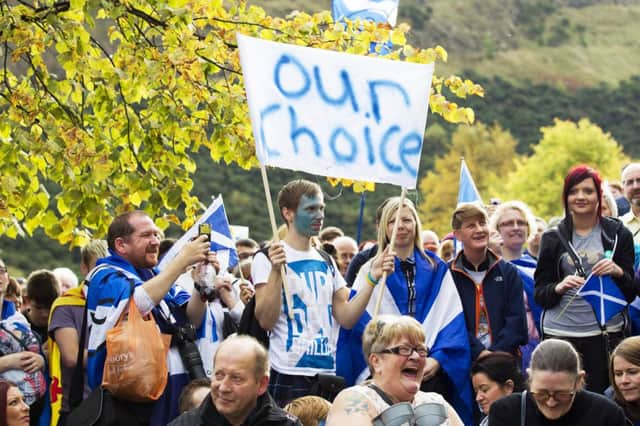Kenny Farquharson: To be a Nat, or not to be a Nat


THERE is nothing I like better than a good political car crash – a campaign strategy so toe-curlingly awful it can only be watched from behind the settee, after the watershed.
For a good example of this I dare you to go to YouTube and find a video the SNP launched at this stage in the last UK general election campaign, in 2010.
Advertisement
Hide AdAdvertisement
Hide AdIt’s a big production number, with some of the party’s biggest celeb supporters, including Martin Compston and Sir Sean Connery, and it features activists parroting the party’s catchy new campaign slogan.


If you can’t quite remember what this slogan is, don’t worry, there’s a good reason.
It was quietly ditched after a week or so after someone at party HQ realised that what sounded like a stroke of genius at a brainstorming awayday was actually the political equivalent of agricultural slurry.
The slogan was: “I’m a Nat because...”
It was truly awful, largely because it just sounded so wrong to hear SNP luminaries speak a word usually used disparagingly by the party’s opponents. It was like hearing David Cameron say: “Hi, I’m a Tory b*****d.” At one point in the video, a rugby player training in the shadow of Murrayfield Stadium approaches the camera and says: “I’m a Nat, and there’s no chance that I’m irrelevant.” Hmm, protesting a little too much, perhaps?
It was just one mistake in a campaign full of errors that on polling day left the SNP with under 20 per cent of the vote.
At the time, SNP strategists said the slogan was an attempt to echo the way gay people had reclaimed the word “queer” and black rappers used the word “n*****”.
But ordinary SNP activists hated it. They’d become so used to the word “Nat” being used as an insult, they just couldn’t bring themselves to reappropriate it for use as a badge of honour.
This was interesting in itself. After all, “Nat” is a simple abbreviation of the word “nationalist”. Surely all supporters of the Scottish National Party would be happy to call themselves a nationalist?
Not so, it seems.
Advertisement
Hide AdAdvertisement
Hide AdDuring the independence referendum campaign I came across numerous SNP members – one of them was MEP Alyn Smith – who admitted they had reservations about being described as a nationalist.
This view was even more common among Yes voters who had come to the independence cause from the Labour Party or the Greens. I came across this sentiment so often I coined a phrase for it. I called these people “I’m not a Nat but…” voters. There were a lot of them, perhaps a fifth of the entire Yes vote.
At the time, this was little more than an interesting detail, easily lost in the momentousness of the campaign. But now, with the SNP’s extraordinary surge in the polls showing every sign of being the new ordinary in Scottish politics, it is easy to see this becoming one of the fault lines within the SNP’s support.
The SNP leadership isn’t stupid. It has seen this one coming. I have it on good authority that Nicola Sturgeon will at some point this year address fully the issue of what nationalism means in a Scottish context in 2015.
This would be wise. Because if she doesn’t define nationalism on her own terms, the SNP’s opponents will do it for her, especially if they detect that some of the SNP’s current supporters can be made to feel uncomfortable about the party’s philosophical underpinning. The SNP as a nationalist party may have less appeal than the SNP as an independence party.
There are obvious problems with the image of nationalism in a global context. Rarely is the word used in a positive sense. The only other nationalists we tend to hear about are pro-Moscow nationalist militias in the Ukraine, or far-right French or German nationalists marching against Muslims. On News at Ten, cuddly nationalists in the SNP’s self-image are few and far between.
The usual SNP counter has been to make a distinction between ethnic nationalism (bad) and civic nationalism (good). But this is a distinction no-one in the SNP has ever spent any length of time teasing out in a convincing manner.
All political parties are coalitions. They contain people of wildly contradictory points of view, with agendas so diametrically opposed it’s a wonder the party exists at all as a coherent unit.
Advertisement
Hide AdAdvertisement
Hide AdThe SNP in particular has always contained apparently incompatible positions, and it hasn’t seemed to do the party much harm. Generations of Labour activists have been deeply frustrated at the way the SNP could present itself as a party of the left in the urban West of Scotland and as the natural home of social and fiscal conservatism in rural Tayside, Angus and Moray.
And yet we now live in an age when identity politics is king, and a party’s prospects can rise and fall on whether voters get a warm glow from associating themselves with its image and perceived purpose, never mind anything so mundane as policy.
If there is a strand of a party’s DNA that is seen as suspect, it can do untold damage to its electoral prospects. That’s what Scottish Labour is discovering to its cost, as it suffers the consequences of its failure of nerve on Home Rule. But no party is immune from this danger. This is a watershed moment for Scottish politics and anything can happen, and happen quickly.
Nicola Sturgeon is right to want to define nationalism on her own terms. It will be a tricky job, but an essential one. Her vision will have to encompass the role of the SNP within the United Kingdom, as well as the party’s destiny as the engine for achieving independence. Much of the logic of the battle for independence simply cannot be read across to politics on a UK stage.
Will she succeed? There will be a simple test. Will her supporters be able to say, without a cringe of embarrassment, “I’m a Nat”?
FOLLOW US
SCOTSMAN TABLET AND MOBILE APPS